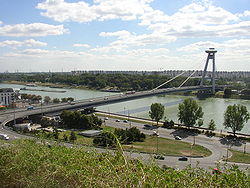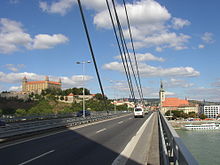- Nový Most
-
Nový Most
Nový Most, from Bratislava CastleCrosses Danube Locale Bratislava Design asymmetric, double-decked cable stayed bridge Total length 430.8 metres (1,413 ft) Width 21.0 metres (68.9 ft) Height 84.60 metres (277.6 ft) (pylon) Longest span 303 metres (994 ft) Construction begin 1967 Construction end 1972 Opened August 26, 1972 Coordinates 48°08′18″N 17°06′16″E / 48.1384°N 17.104581°ECoordinates: 48°08′18″N 17°06′16″E / 48.1384°N 17.104581°E Nový Most (Slovak for "New Bridge"; formerly Most SNP, Bridge of the Slovak National Uprising) is a road bridge over the Danube in Bratislava, the capital of Slovakia. It is the 32nd-tallest, and thus shortest, member of the World Federation of Great Towers, and is the only bridge to be a member. It is the world's longest cable-stayed bridge to have one pylon and one cable-stayed plane.
It is an asymmetrical cable-stayed bridge with a main span length of 303 metres. Its steel construction is suspended from steel cables, connected on the Petržalka side to two pillars. The total length of the bridge is 430.8 metres, its width 21 metres, and it weighs 7537 tonnes.
A special attraction is its flying saucer-shaped structure housing a restaurant, called "UFO" (since 2005; previously called Bystrica), on the bridge's 84.6 metre pylon. The restaurant is reached using an elevator situated in the left pillar, and offers a good view over Bratislava. In the right pillar there is an emergency staircase with 430 stairs.
Nový Most has 4 upper lanes for cars, and lanes for bicycles and pedestrians beneath the roadway on both sides.
Construction
The bridge was built between 1967 and 1972 under a project managed by A. Tesár, J. Lacko, and I. Slameň. It officially opened on August 26, 1972, as the second bridge over the Danube in Bratislava. A significant section of the Old Town below Bratislava Castle, which included nearly all of the Jewish quarter, was demolished to create the roadway that led to it; on the other hand, the bridge improved access between Petržalka and the rest of the city. Parts of the historical city walls were unearthed during construction.
See also
External links
- UFO Restaurant (Slovak)
- New Bridge at Structurae
- New Bridge (Hungarian)
- Panoramic view of Novy Most bridge & River Danube
Bridges of the Danube Upstream
Lafranconi BridgeNový Most Downstream
Starý most
This article about a bridge in Europe is a stub. You can help Wikipedia by expanding it. This article about transport in Slovakia is a stub. You can help Wikipedia by expanding it.


